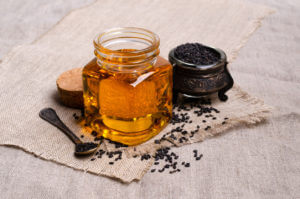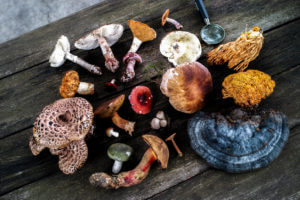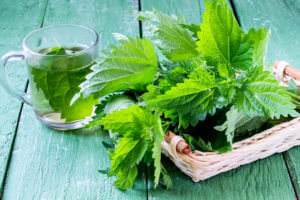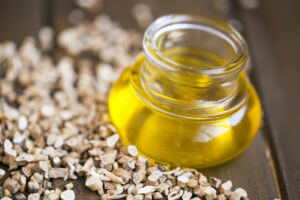Looking for a natural way out from under your seasonal allergy symptoms? Seasonal allergies, sometimes called “hay fever” can make you feel like you’re living your life underneath a haze of sniffles, sneezes, and sinus congestion, but what if there was a way to work with nature–instead of against it?
With integrative medicine you can leverage natural antihistamines in the right foods and supplements that can decrease histamine release and provide you relief from your seasonal allergy symptoms–all without the drowsiness and other side effects that often accompany OTC allergy meds.
Natural Antihistamines to Reduce Seasonal Allergy Symptoms

You might be familiar with antihistamines in OTC products for seasonal allergies, but there are compounds in foods, herbs, and other botanicals that can also help your immune system produce less histamine, therefore leading to a more mild allergic reaction.
This means less sneezing, watery eyes, congestion, and runny noses for you and your family. Antihistamines are surprisingly easy to find in common foods, and even more so in a few staple supplements.
Before we look at natural antihistamines, let’s learn a little bit about the ‘histamine’ component of antihistamines!
What Histamines Do — A Brief Allergy Background
Histamine is the amino acid responsible for the unpleasant allergy symptoms you recognize as runny nose, itchy, watery eyes, sinus congestion, sneezing, and much more. Histamine is produced by mast cells in response to various allergic or environmental triggers (things like pollen, dust, dander, or other skin irritants) (1).
Mast cells interact with other cells in your immune system to produce inflammation, which you recognize as coughing, sniffling, sneezing, and all your favorite allergy symptoms.
So, even though histamine is one component of your allergic response, modulating or decreasing its production can have a significant positive effect on decreasing your allergy symptoms.
Natural antihistamines may not be able to match the potency of OTC options, but their effectiveness is well-documented if you’re seeking a more functional approach.
Integrative Medicine Therapies for Allergies
Ask your provider at CentreSpringMD about the diverse options available for allergy symptoms. In addition to histamine support, your doctor may also recommend:
- Acupuncture
- Allergy identification testing
- Mast cell stabilizers
- Detox pathway evaluation
Contact your CentreSpringMD team today to get started.
To modulate histamine, quercetin is one versatile and easy-to-find phytonutrient commonly used as a natural antihistamine by functional medicine doctors and conventional doctors alike.
The Benefits of Quercetin for Allergies
Quercetin is a flavonoid, which is a type of compound naturally found in plants and plant foods, that inhibits the release of histamine from your immune system, thereby reducing side effects such as itchy, watery eyes, sneezing, and sinus congestion.
Quercetin has been shown to:
- Inhibit the release of histamine
- Decrease proinflammatory cytokines
- Support a balanced Th1 and Th2 immune response
In fact, the plant extract of quercetin is the main ingredient of several potential anti-allergic drugs that act as immunomodulators due to their suppression of pro-inflammatory cytokines (2).
These mechanisms make quercetin a common choice for integrative medicine doctors when patients ask about natural remedies for seasonal allergies.
You’ll often find quercetin in foods and supplements with bromelain, which is an enzyme that helps increase the bioavailability of quercetin.
Other Functional Antihistamine Foods Include:
- Apples
- Onions
- Thyme
- Ginger
- Spirulina
- Pineapple
- Broccoli
When allergy season calls for increased support, tap into the allergy-fighting power of these natural antihistamine compounds listed below.
4 Natural Antihistamines
1. Black Seed Oil

This amber-colored oil made from the black seeds of the flowering Nigella sativa plant possesses powerful anti-allergic, anti-inflammatory, and immune supportive constituents.
In one study, more than half the participants noticed an improvement in allergy symptoms such as nasal irritation and inflammation after using black seed oil for 6 weeks (3).
Black seed oil has also made headlines recently for its potential in modulating inflammatory responses in the lungs (4). The medicinal properties of thymoquinone, one constituent of black seed oil, can inhibit the release of histamine, thereby serving to reduce inflammation within the respiratory system specifically.
Because of this, black seed oil may be a prime candidate for reducing respiratory allergy symptoms.
2. Medicinal Mushrooms
 If you struggle with seasonal allergy symptoms like congestion or an itchy nose, medicinal mushrooms might become your new best friends. These fungi contain 3 major physiologically active constituents–polysaccharides, peptidoglycans, and triterpenes–that are considered immunomodulatory and anti-inflammatory.
If you struggle with seasonal allergy symptoms like congestion or an itchy nose, medicinal mushrooms might become your new best friends. These fungi contain 3 major physiologically active constituents–polysaccharides, peptidoglycans, and triterpenes–that are considered immunomodulatory and anti-inflammatory.
The chaga mushroom may not be much to look at, but don’t let its rough appearance fool you–it has more antioxidant capacity per ounce than any other single ingredient found in nature.
Chaga extract has been shown not only to quench reactive oxygen special (ROS) that can cause damaging inflammation (and worsen allergy symptoms), but it also promotes a balanced immune response when exposed to a potential allergen.
This is because chaga promotes a balance between the anti-inflammatory (Th2) and pro-inflammatory (Th1) arms of your immune system (5).
The reishi mushroom goes by many names, including “the mushroom of immortality,” as it has been used in Eastern healing practices for centuries. The reishi mushroom’s benefits are vast, and they include immunomodulation, anti-inflammation, and supporting respiratory health. These three factors make the reishi mushroom a prime choice to support resilience against seasonal allergies.
Discover the incredible benefits of these mushrooms with Metagenics Mycotaki.
3. Stinging Nettle
 The stinging nettle plant isn’t very friendly to the touch, but prepared correctly it has been used for centuries as a tonic for a variety of ailments–especially those involving inflammation and histamine.
The stinging nettle plant isn’t very friendly to the touch, but prepared correctly it has been used for centuries as a tonic for a variety of ailments–especially those involving inflammation and histamine.
One study shows nettle prevents the release of proinflammatory signals that prompt mast cells to release histamine (6). Nettle is particularly effective for respiratory allergy symptoms.
Even though you can find nettle plants growing wild in many parts of the country, most people choose a tincture or a freeze-dried form sold in most natural foods stores.
You can find nettle in Seasonal Shield.
4. Astragalus
 Astragalus, like quercetin, has a wide range of uses and is a versatile remedy for various parts of the immune response.
Astragalus, like quercetin, has a wide range of uses and is a versatile remedy for various parts of the immune response.
While astragalus doesn’t act directly upon histamine, this Ayurvedic botanical increases a specialized immune protein called interferon (7). The activation of interferons suppresses mast cell function, including the release of histamine (8).
In addition to it’s impact upon mast cell function, astragalus has been primarily used in traditional Chinese medicine as a lung tonic, and has been shown to decrease the occurrence of upper respiratory infections in children (9).
Functional Medicine and Seasonal Allergies
Even though seasonal allergy symptoms are common, more and more people continue to have allergy responses throughout the year, making finding effective solutions that work for your lifestyle even more important.
Functional medicine can help your immune system do its job effectively, while reducing allergy symptoms triggered by both indoor and outdoor allergens.
Resources
- https://www.frontiersin.org/articles/10.3389/fimmu.2018.01873/
- https://www.ncbi.nlm.nih.gov/pmc/articles/PMC6273625/
- https://pubmed.ncbi.nlm.nih.gov/23855426/
- https://www.ncbi.nlm.nih.gov/pmc/articles/PMC7347483/
- https://www.ncbi.nlm.nih.gov/pmc/articles/PMC1160565
- https://pubmed.ncbi.nlm.nih.gov/19140159/
- https://www.researchgate.net/publication/232766687
- https://journals.plos.org/plosbiology/article?id=10.1371/journal.pbio.3000530
- https://www.researchgate.net/publication/236676210

